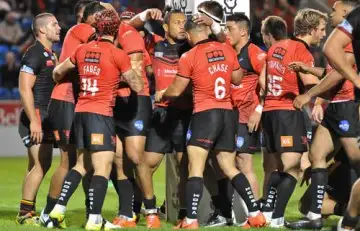The defence rests

“Three words that we will be using a lot this week are defence, defence and defence”. These are the words of Salford coach Ieystyn Harris after his side’s 40-all draw with the Catalans Dragons in Perpignan.
Between them the two sides posted 14 tries and a point was scored for every minute of the game. Harris raised the same issue after the Red Devils’ 32-28 win over Hull the previous week.
Dragons boss Laurent Frayssinous – after he had stopped complaining about the last-minute penalty against Morgan Escaré – expressed a similar sentiment: “Defensively it is very frustrating for us, to concede 40 points and the way that we conceded them. We knew Salford are a great team with the ball but it is hard to swallow to concede 40 points at home.”
While such a close and high-scoring game is certainly thrilling in its way, it doesn’t really show rugby league at its best. The spectator misses out on the strong defence and tough tackling that should be part of the game.
Neither side had to work particularly hard to score on Saturday. That’s not to say that players weren’t exerting themselves or putting their energy into the game – it’s just that tries were scored without the attacking side having to do anything special.
Take for example Ben Pomeroy’s 34th-minute try, in which he simply brushed past Theo Fages and Kevin Locke; or Ian Henderson’s 73rd-minute try, when as loose forward he simply picked the ball up from the base of the scrum and crossed the line, literally without a hand being placed on him.
The best rugby league tries are scored when a great bit of handling, a show of strength or a well-placed kick creates space for the attackers. That isn’t the case when defenders just fall off an attacker, or a space simply opens up in front of him.
It might be that Harris’ focus on defence has been prompted by the presence at Salford of Tim Sheens. It seems that Australians focus on defence more than we do, and that shows itself in the NRL – in Super League last season, the average number of points scored in a game was fifty (49.978). By contrast in the NRL it was just over forty (41.182).
The worst NRL defence was that of West Tigers, who conceded an average of 26 points per game. The worst Super League defence – London Broncos – conceded 46 points per game. If it is objected that the Broncos were especially poor last season, then the second-worst defence – Bradford Bulls – still conceded an average of 36 points per game.
In last weekend’s Super League, four teams out of twelve posted forty points or more. In the opening round of the NRL, only one team out of sixteen – Parramatta Eels – did likewise.
Tighter, lower-scoring games are in my view more entertaining than 80-point try-fests. They help to sharpen attacking skills, and a greater focus on defence would help the English national side when taking on Australia and New Zealand. Hopefully Harris and Sheens can implement a more defensive mindset at Salford, and other coaches and clubs will follow suit.
Ambition and optimism
RFL chief executive and RLIF chairman Nigel Wood has been in ambitious and optimistic mood over the last week. Wood has set out a series of targets for the RFL to achieve prior to 2021, including increasing turnover from £118m to £146m, attendees at games from 2.3 million to 3 million and TV viewers from 17 million to 22 million. Wood has also made an England victory in the 2017 World Cup a target, as well as victory in all home Test series.
It would be easy to scoff at our chances of success, but it’s heartening to see that the RFL has some ambition for the game. It’s also a brave step to publish such targets, because the RFL are setting themselves up for serious criticism, and not just in 2021 either – as early as this autumn should England fail to defeat New Zealand.
With his RLIF hat on, Wood has also been talking about vast improvements to international rugby league. This is no small thing considering that Australian rugby league, given the self-sufficiency of the NRL and State of Origin, tends to have the international game low on its list of priorities, while the vast majority of rugby league-playing nations are still in the development stage. Nevertheless, it’s great to see a compelling vision for international rugby league being brought into focus.
Kiwi test of McNamara’s future
Steve McNamara has offered reassurances that he is fully focused on this autumn’s three-match Test series against New Zealand (which is good news for Nigel Wood, the series being effectively the first item on his list of objectives). That’s despite his current contract coming to an end at the end of the year.
The RFL have probably made the right decision now to renew McNamara’s contract just yet. I think he’s done a very good job off the pitch, and a decent job on it – the performances at the World Cup showed a marked improvement, although last season’s Four Nations defeat to a weakened Australia was quite disappointing. Yet despite the improvements made by McNamara the results simply haven’t followed. Since his appointment in 2010 England have posted only one win against the big two – a 28-6 victory over New Zealand in 2011.
That being the case, should McNamara’s England fail to win this autumn’s series, it would perhaps be better to find another coach to take England into the 2017 World Cup.
Keep Your Eye on Rugby League
Twitter: @Tony_Williams88